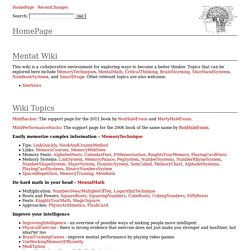

5 Freewriting Secrets for Being a "Genius". You've heard of freewriting, certainly. At its most basic, it's about forcing your internal editor to stay away while you splash your most raw and unusual thoughts onto the page. In Accidental Genius: Using Writing to Generate Your Best Ideas, Insights, and Content (2nd edition, revised & updated), Mark Levy tells how he uses freewriting, not only to loosen up his writing muscles, but to solve business problems of all kinds. Levy, author, writing teacher, and marketing strategist, shares a few "secrets" for making freewriting an indispensible tool: 5 Freewriting Tips. Backmasking & Reverse Speech. What is Reverse Speech?

It has been called the discovery of the 7th sense. The research into this phenomenon has been described as being of "Nobel calibre". It has been featured in numerous publications around the world, and in the United States it became a household name in the late 90s. It is called Reverse Speech, the phenomenon of hidden backward messages in speech. It initially gained worldwide fame in the early 80s as those strange backward messages in rock and roll. If human speech is recorded and played backwards, mixed amongst the gibberish at regular intervals can be heard very clear statements. The pioneer and 20 year veteran of this field, Australian David John Oates, describes Reverse Speech as another form of human communication. The applications of this discovery are exciting. Although still a new and emerging field, Reverse Speech is already making its mark felt in many areas.
How to Re-program Your Memory to Become More Self-Reliant. Highly Trusting People Better Lie Detectors. How to Promote Visionary Thinking. Why we are more creative when mind and body are out of step.

Usually we perform best with mind and body in sync. With our thoughts tied to our actions decisions are made faster, we are more engaged and we feel at one with ourselves. If you want to be creative, though, sometimes it pays to be out of sync according to a recent study by Huang and Galinsky (2011). They had some people recalling a happy time in their life while at the same time frowning.
Another group recalled sad memories while smiling. In two comparison groups, participants were told to produce consonant mind-body states, i.e. happy memory plus happy face and sad memory plus sad face. The All-Time Top Six Psychological Reasons We Love Music. What psychological roles does music play in our lives?

Modern technology means it’s never been easier to hear exactly the music we want, whenever we want it. But whatever technology we use, the reasons we listen to music are universal. Music grabs our emotions instantly in a way few other art-forms can manage. THE REVOLUTIONARY PLEASURE OF THINKING FOR YOURSELF. How to Hack Your Brain. Manipulation News, Videos, Reviews and Gossip - Lifehacker. "Mind-Mapping": How We Manipulate the People We Love. December 7, 2011 | Like this article?

Join our email list: Stay up to date with the latest headlines via email. Conventional therapeutic wisdom aside, people typically don’t hurt each other because they’re out of touch, unable to communicate, or can’t help themselves. All too frequently, they do hurtful things with impunity and entitlement simply to gratify their own needs. Thirty years of working with couples and observing the limitations of this attitude has led me to develop an approach not focused on clients’ fears, insecurities, or wounded “inner child,” or on the deficiencies of their early attachments. The key to grasping the roots of this “inner game” is to understand the brain’s ability to map another person’s mind—what I call “mind-mapping,” a process neuroscientists have studied as the Theory of Mind for the past 30 years.
Getting Past the Games Married for 25 years, Stanley and Kristin, a couple in their early 50s, came to see me for a sexual problem. Home Page. This wiki is a collaborative environment for exploring ways to become a better thinker.

Topics that can be explored here include MemoryTechniques, MentalMath, CriticalThinking, BrainStorming, ShorthandSystems, NotebookSystems, and SmartDrugs. Other relevant topics are also welcome. SiteNews Wiki Topics Mindhacker: The support page for the 2011 book by RonHaleEvans and MartyHaleEvans. MindPerformanceHacks: The support page for the 2006 book of the same name by RonHaleEvans. Easily memorize complex information - MemoryTechnique Do hard math in your head - MentalMath Improve your intelligence Think better Other pages.
Why Do Some People Learn Faster? The physicist Niels Bohr once defined an expert as “a person who has made all the mistakes that can be made in a very narrow field.”

Bohr’s quip summarizes one of the essential lessons of learning, which is that people learn how to get it right by getting it wrong again and again. Education isn’t magic. Education is the wisdom wrung from failure. A new study, forthcoming in Psychological Science, and led by Jason Moser at Michigan State University, expands on this important concept. The question at the heart of the paper is simple: Why are some people so much more effective at learning from their mistakes?